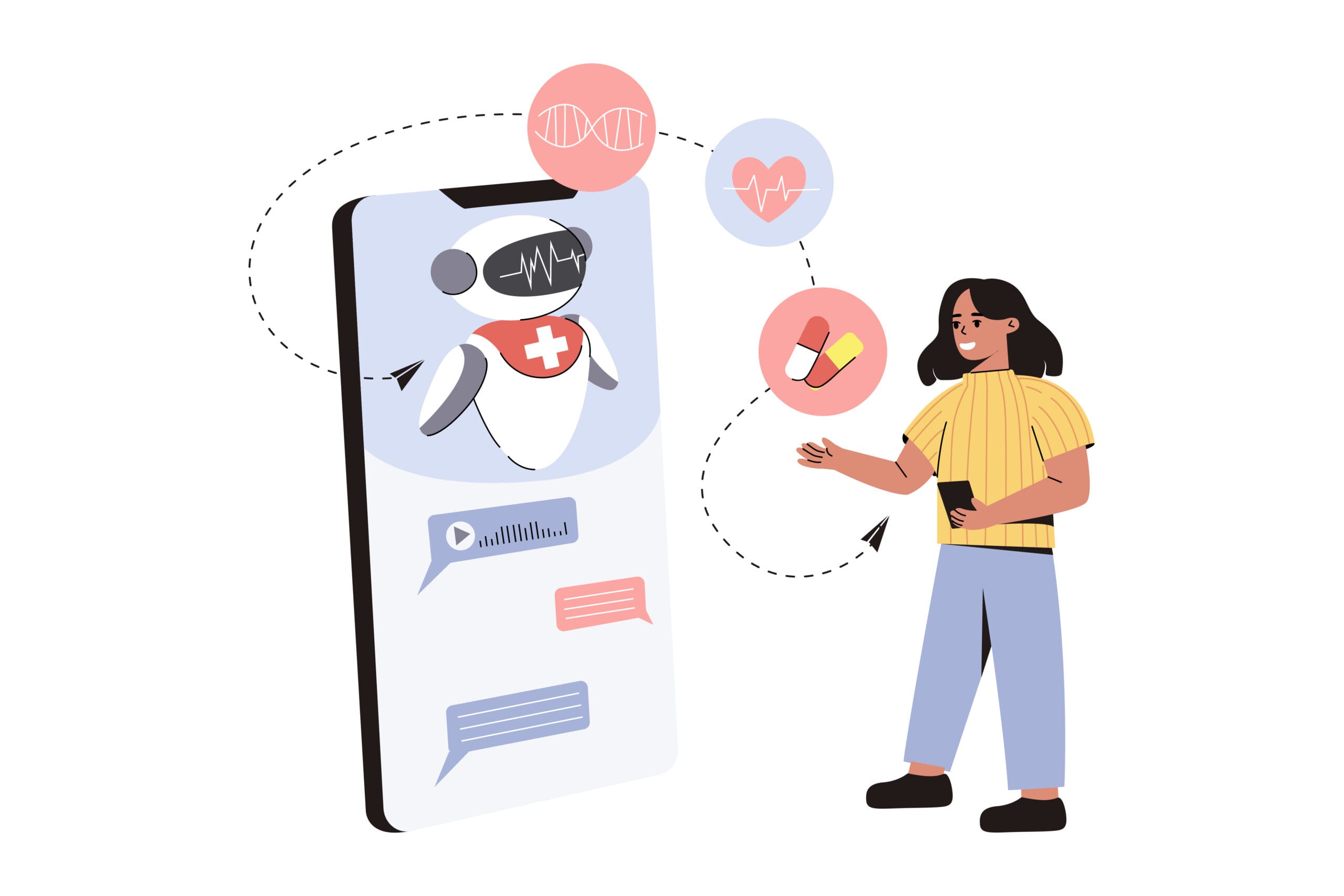AI Chatbots in healthcare have revolutionized the way patients receive support, providing round-the-clock assistance from virtual assistants. This virtual assistant is available at any time to address medical concerns and offer personalized guidance, making it easier for patients to have conversations with hospital staff and pharmacies. The convenience and accessibility of chatbots have transformed the physician-patient relationship.
With their ability to offer tailored assistance, chatbots enhance patient satisfaction and improve outcomes. They alleviate the burden on hospital staff by handling routine queries, allowing physicians and nurses to dedicate more time to critical cases. Moreover, as artificial intelligence continues to advance, chatbots are becoming increasingly intelligent, capable of addressing complex medical questions with accuracy.
The impact of AI chatbots in healthcare, especially in hospitals, cannot be overstated. By bridging the gap between patients and physicians, they help individuals take control of their health while ensuring timely access to information about medical procedures. As technology evolves further, we can expect the future of chatbots to play an even more significant role in transforming how we approach healthcare delivery.
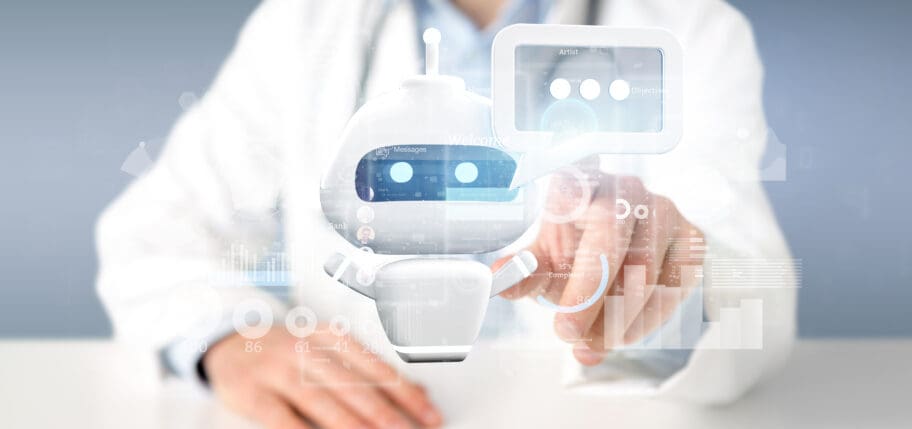
Use of Chatbots in Healthcare
Assisting in Triage and Timely Care
One of the primary use of chatbots in healthcare is their ability to assist in triaging patients at the hospital based on their symptoms, ensuring timely care. Chatbots can act as virtual assistants, gathering information about a patient's symptoms and providing initial recommendations from a doctor. This helps streamline the process by identifying urgent cases that require immediate attention from healthcare professionals at the hospital. For instance, if a patient reports severe chest pain, the chatbot can quickly recognize it as a potential heart attack symptom and advise seeking emergency medical assistance at the hospital.
Medication Reminders and Chronic Condition Management
Another valuable use case for healthcare AI chatbots is providing medication reminders and helping patients manage chronic conditions effectively with the assistance of a medical procedure. By sending regular reminders through messaging platforms, chatbots ensure that patients adhere to their prescribed medication schedules. They can offer educational resources about the condition, provide tips for self-care, and answer common questions related to managing chronic illnesses. This support, facilitated by the doctor using AI technology, empowers patients to take control of their health and promotes better adherence to treatment plans.
Mental Health Support and Coping Strategies
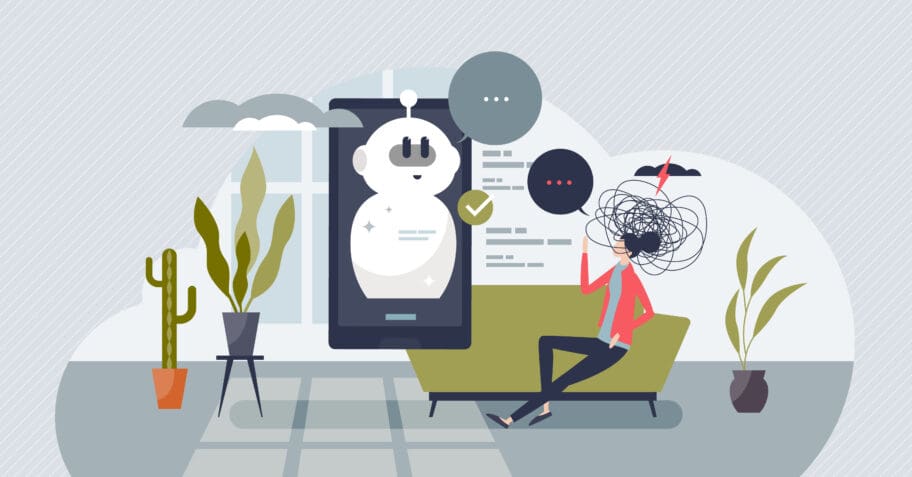
AI Chatbots also play a crucial role in the healthcare industry by offering mental health support. They provide resources and guide users through coping strategies, creating a safe space for individuals to discuss their emotional well-being anonymously.
Through conversation-based interactions, these chatbots can offer mindfulness exercises, stress management techniques, or even connect users with licensed therapists when necessary. The availability of such mental health support tools helps reduce barriers to accessing professional help while promoting emotional well-being in the medical procedure field.
Remote Monitoring for Enhanced Post-Operative Care
In the realm of post-operative care, AI chatbots help enhance overall recovery processes by using AI technology to facilitate remote monitoring of patients' vital signs. By integrating with wearable devices or smart home technologies, these chatbots collect real-time data on metrics like heart rate, blood pressure, or glucose levels.
This continuous monitoring allows healthcare providers to detect any deviations from normal values promptly. In case of alarming changes, the chatbot can trigger alerts to both patients and healthcare professionals, ensuring timely intervention and reducing the risk of complications.
Enhancing Patient Engagement and Experience
AI Chatbots have revolutionized the healthcare experience by providing a seamless and interactive platform for patients to engage with. With the help of AI, chatbots create a more natural and user-friendly way for patients to interact with healthcare providers through their conversational interfaces.
One of the key benefits of using AI chatbots in healthcare is their ability to provide educational content. Patients can use chatbots to receive valuable information about their health conditions directly, empowering them with knowledge to make informed decisions about their well-being. Whether it's explaining symptoms, treatment options, or medication instructions, chatbots serve as virtual assistants that ensure patients are well-informed about their medical concerns.
In addition to educating patients, AI chatbots also play a crucial role in promoting preventive care. By using AI to offer personalized recommendations for healthy habits, such as exercise routines or dietary guidelines, they encourage patients to adopt healthier lifestyles. This proactive approach not only improves patient outcomes but also reduces the burden on healthcare systems by preventing the onset of chronic diseases.
Convenience is another significant advantage that chatbots bring to the table. Patients no longer need to wait on hold or navigate complex websites to access their medical records or test results. With just a few clicks on a chatbot platform, patients can conveniently retrieve all relevant information related to their health. This streamlined process saves time and effort for both patients and healthcare providers alike.
Furthermore, chatbots contribute to enhancing patient experience in the healthcare industry by providing round-the-clock support for health systems. Unlike traditional customer service hotlines that operate within limited hours, chatbots are available 24/7. This accessibility ensures that patients in the healthcare industry can seek assistance whenever they need it most, regardless of the time zone or geographical location they are in.
To illustrate the impact of using chatbots in healthcare, consider how many patients benefit from these advancements daily:
- A working mother in the healthcare industry who needs immediate advice regarding her child's fever can rely on medical chatbots, which are conversational chatbots powered by AI, for instant guidance.
- An elderly patient managing a chronic condition can receive regular reminders and personalized recommendations for medication adherence through medical chatbots. Conversational chatbots integrated within health systems use AI to provide these reminders and recommendations.
- A busy professional seeking information about mental health resources can engage with a mental wellness chatbot to access relevant support.
Streamlining Appointment Scheduling for Efficiency
AI Chatbots have revolutionized the way healthcare facilities manage appointment scheduling, bringing about significant improvements in efficiency and convenience. By automating this process, chatbots have successfully reduced wait times for patients, ensuring a seamless experience from the moment they seek medical assistance.
One of the key advantages of using chatbots for scheduling appointments is their ability to integrate with existing systems. These intelligent bots can instantly check doctors' availability in real-time before confirming appointments. This integration ensures that patients are promptly assigned to an available doctor without any delays or confusion. Gone are the days of endless phone calls and waiting on hold while staff members manually check schedules.
Moreover, chatbot interfaces provide patients with the flexibility to reschedule or cancel appointments effortlessly. With just a few clicks or taps, individuals can modify their appointment timing according to their needs or unexpected circumstances. This feature not only empowers patients but also reduces the burden on healthcare staff who would otherwise need to handle these requests manually.
In addition to streamlining appointment scheduling, chatbots play a crucial role in minimizing no-shows in health systems through automated reminders. Both doctors and patients receive timely notifications via text messages or emails, reminding them about upcoming appointments. These reminders significantly reduce the chances of forgetfulness or miscommunication between parties involved in health systems.
Imagine a scenario where a patient requires prescription refills but is unable to visit the clinic physically due to various reasons such as distance or time constraints. Chatbots come to the rescue by offering an efficient solution through their user-friendly interfaces. Patients can request prescription refills directly through the chatbot app, saving valuable time and effort for both themselves and healthcare providers.
The implementation of chatbots also benefits healthcare teams by allowing them to focus on more critical tasks rather than spending excessive time managing appointment schedules manually. By automating this administrative aspect, medical professionals can dedicate more attention to patient care and complex cases that require their expertise.
To illustrate further how beneficial chatbots can be in streamlining appointment scheduling in health systems, let's consider a case study. In a busy medical practice, Dr. Smith's team was overwhelmed with numerous phone calls and manual paperwork related to appointments in their health system.
After adopting a chatbot system, they witnessed a remarkable improvement in their workflow within their health system. The chatbot seamlessly integrated with their existing software, providing real-time updates on doctors' availability and reducing the time spent on rescheduling or canceling appointments in their health system.
Providing Instant Response to Common Queries
AI Chatbots in healthcare play a crucial role in providing instant responses to common inquiries and questions that patients may have. These intelligent virtual assistants are designed to quickly address frequently asked questions regarding symptoms, medications, and general health information. 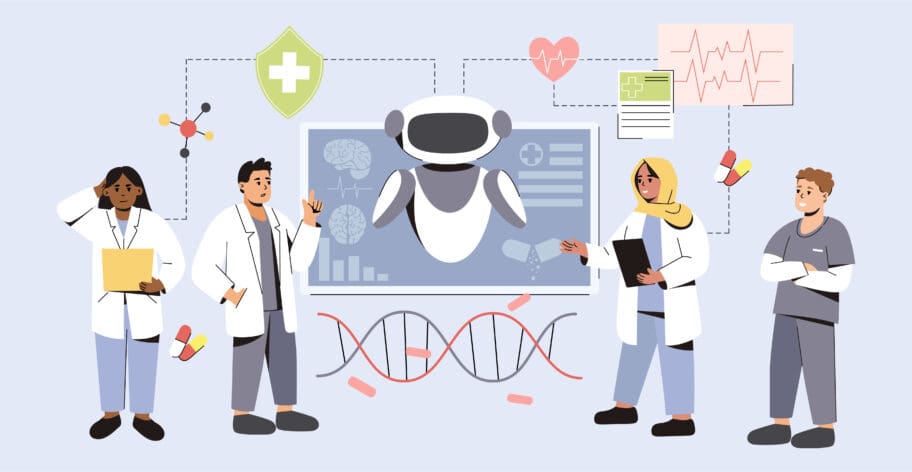
One of the key advantages of chatbots is their ability to offer reliable and up-to-date information sourced from trusted medical databases or institutions. This ensures that patients receive accurate guidance and answers to their queries. By accessing a vast pool of medical resources, chatbots can provide users with comprehensive information on various health topics.
During emergencies or when seeking urgent medical advice, chatbot platforms offer immediate assistance. Patients can rely on these conversational agents for quick access to help and guidance. Whether it's a minor health issue or a crisis situation, chatbots are available 24/7 to address user concerns promptly.
The language processing capabilities of chatbots enable them to understand user queries accurately. Through natural language understanding algorithms, these virtual assistants can decipher the intent behind the questions posed by patients. This allows them to provide relevant responses tailored to the specific needs of each individual.
In addition to answering general health-related questions, chatbots also assist users with issues related to insurance coverage and making appointments. Patients can inquire about their insurance policies, coverage details, and any other concerns they may have regarding their healthcare plans. Chatbots streamline this process by providing quick and accurate information without the need for lengthy phone calls or waiting times.
Moreover, chatbots act as valuable resources for patients who require assistance but may not have immediate access to healthcare professionals. In cases where individuals face geographical barriers or limited availability of doctors, chatbots bridge the gap by offering accessible support and guidance.
By leveraging the expertise of medical professionals and incorporating their knowledge into an automated system, chatbots ensure that users receive reliable advice even in the absence of human experts. These virtual assistants are trained using vast amounts of data from medical professionals, enabling them to provide accurate information and guidance to patients.
Improving Efficiency and Reducing Costs in Healthcare
AI Chatbots have revolutionized the healthcare industry by offering a multitude of benefits that contribute to improving efficiency and reducing costs. These intelligent virtual assistants automate various administrative tasks, allowing health systems, hospitals, and medical professionals to focus more on providing quality care to patients. Let's explore how chatbots are transforming the healthcare landscape.
Automating Administrative Tasks
One of the key advantages of using chatbots in healthcare is their ability to automate time-consuming administrative tasks. For instance, they can handle insurance verification and claims processing seamlessly, eliminating the need for hospital staff to manually navigate through complex paperwork. By streamlining these processes, chatbots save valuable time and resources for both patients and healthcare organizations.
Integration with Electronic Health Record Systems
AI Chatbots also play a crucial role in reducing manual data entry by integrating with electronic health record (EHR) systems. This integration allows them to access patient information quickly and efficiently, eliminating the risk of human errors associated with manual data input. With accurate and up-to-date patient records readily available, physicians can make informed decisions regarding treatments or medical procedures without wasting time searching for essential information.
Streamlining Workflows for Cost Savings
By streamlining workflows across different departments within hospitals or clinics, chatbots contribute significantly to cost savings for healthcare organizations. They ensure that communication between medical professionals is seamless and efficient, minimizing delays in patient care. For example, when a physician prescribes medication, a chatbot can automatically send an electronic prescription directly to pharmacies, eliminating the need for manual intervention.
Moreover, chatbots simplify appointment scheduling by allowing patients to book appointments online or through messaging platforms. This not only reduces administrative overhead but also ensures that physicians' schedules are optimized efficiently. As a result, hospitals can maximize their resources by effectively managing patient flow while reducing waiting times.
Ensuring Accurate Documentation
Accurate documentation is crucial in maintaining comprehensive patient records. Chatbots minimize the risk of errors and omissions by ensuring that all necessary information is recorded accurately. This includes details about medical history, treatments, medications, and any other relevant data. With chatbots handling documentation tasks, physicians can focus more on patient care and treatment plans without worrying about missing critical information.
Addressing Public Health Concerns like the COVID-19 Symptom Checker
The use of chatbots in healthcare has become increasingly prevalent, particularly in addressing public health concerns, including COVID-19 pandemic during previous years. These AI-powered tools have proven to be invaluable in screening individuals for COVID-19 symptoms and providing guidance on necessary precautions.
One of the key advantages of chatbots is their ability to offer up-to-date information about testing centers, vaccination sites, and updated pandemic guidelines. With the constantly evolving nature of the virus, having access to accurate and timely information is crucial. Chatbots can provide users with a list of nearby testing centers or vaccination sites based on their location, ensuring they have easy access to these important resources.
In addition to providing information, chatbots also play a vital role in contact tracing efforts. By collecting relevant information from users who may have been exposed to the virus, these bots assist in identifying potential hotspots and preventing further spread. Users can report their symptoms or any recent close contacts they may have had through the chatbot interface, enabling health authorities to take swift action.
Continuous monitoring of symptoms is another area where chatbots excel. By regularly checking in with users and asking about their well-being, these bots facilitate early detection of potential COVID-19 cases. If a user reports experiencing common symptoms associated with the virus such as fever, coughing, or loss of taste and smell, the chatbot can provide guidance on what steps should be taken next. This could include self-isolation recommendations or advising them to seek medical attention if necessary.
Moreover, chatbots offer an efficient way for individuals to assess their risk level without overwhelming healthcare systems already under strain due to the pandemic. Instead of inundating hospitals and clinics with patients reporting mild symptoms or seeking general advice, people can turn to chatbots for initial assessments. This reduces unnecessary burden on healthcare providers while ensuring that those who genuinely require medical attention receive it promptly.
Ensuring Accurate Collection of Patient Data and Feedback
AI Chatbots have revolutionized the way patient data is collected in healthcare settings. With their efficient capabilities, they streamline the process of gathering vital information during initial assessments or follow-up consultations. By engaging patients in interactive conversations, chatbots can elicit detailed responses and ensure accurate data collection.
Patient data plays a crucial role in providing personalized healthcare services. Chatbots enable healthcare providers to collect this information seamlessly by asking relevant questions and recording patients' responses. This automated approach eliminates the need for manual data entry, reducing errors and saving time for both patients and healthcare professionals.
Moreover, chatbots empower patients to provide valuable feedback on their healthcare experiences. Through conversational interfaces, they create an environment where individuals feel comfortable sharing their thoughts, concerns, and suggestions. This feedback is invaluable for providers as it helps them identify areas that require improvement and enhance the overall quality of care.
One significant advantage of using chatbots in collecting patient data is the assurance of privacy and confidentiality. These intelligent systems are designed with secure data encryption protocols that safeguard sensitive patient information from unauthorized access or breaches. By adhering to strict security measures, chatbots ensure that patient privacy remains intact throughout every interaction.
In addition to collecting patient data and feedback, chatbots play a pivotal role in conducting automated surveys. These surveys gather valuable insights into various aspects of healthcare delivery such as service quality, satisfaction levels, and treatment outcomes. The ability to analyze large volumes of survey responses allows healthcare organizations to identify trends, make informed decisions, and implement targeted interventions for continuous improvement.
By leveraging chatbot technology for survey administration, hospitals and clinics can achieve higher response rates compared to traditional methods like paper-based surveys or phone interviews. Patients find it convenient to provide feedback through user-friendly interfaces at their own pace without any external pressure.
Benefits of Chatbots in Healthcare
AI Chatbots have revolutionized the healthcare industry, offering a wide range of benefits that enhance accessibility, improve patient engagement, and reduce costs. Let's explore the key advantages of using chatbots in healthcare.
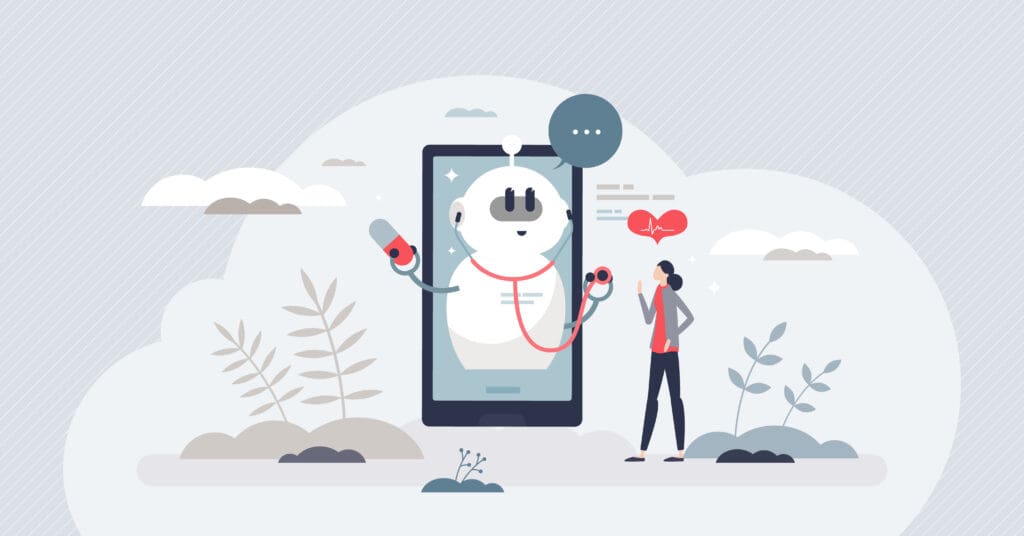
Enhanced Accessibility to Healthcare Services
Individuals with limited mobility or geographical constraints often struggle to access healthcare services. However, chatbots provide a solution by bridging this gap. Through virtual interactions, patients can easily consult with healthcare professionals without leaving their homes. This is particularly beneficial for those residing in remote areas where medical facilities are scarce. By leveraging chatbot technology, individuals can receive prompt medical advice and support regardless of their physical location.
Reduced Wait Times at Hospitals or Clinics
Long wait times at hospitals or clinics can be frustrating for patients seeking immediate medical attention. With the implementation of chatbot solutions, these delays can be significantly reduced. Chatbots offer round-the-clock support and instant responses to queries, enabling patients to receive necessary guidance without enduring lengthy waiting periods. By providing remote assistance through chat interfaces, healthcare organizations can optimize their resources and prioritize urgent cases effectively.
Improved Patient Engagement and Treatment Adherence
Engaging patients in their own healthcare journey is crucial for successful treatment outcomes. Chatbots play a vital role in fostering patient engagement by facilitating interactive conversations. Patients can communicate with chatbots to seek information about their conditions, medications, or treatment plans anytime they need it. These interactions promote better understanding and empower individuals to actively participate in managing their health. Moreover, regular check-ins from chatbots remind patients about medication schedules and follow-up appointments, leading to improved treatment adherence.
Cost-Effectiveness for Healthcare Organizations
Implementing advanced technologies often comes with significant costs; however, chatbot solutions offer an affordable option for healthcare organizations looking to enhance patient care without straining their budgets excessively. Compared to hiring additional staff members or investing in complex systems, deploying chatbots proves cost-effective in the long run. Chatbots can handle routine inquiries, appointment scheduling, and basic triage, freeing up healthcare professionals' time to focus on more critical tasks. This not only reduces operational expenses but also increases overall efficiency within healthcare facilities.
The Future of Healthcare Chatbots
In conclusion, healthcare chatbots have emerged as a valuable tool in the healthcare industry, revolutionizing the way patients engage with healthcare providers. These intelligent virtual assistants have proven to be effective in various use cases, enhancing patient engagement and experience, streamlining appointment scheduling, providing instant responses to common queries, improving efficiency and reducing costs, addressing public health concerns with COVID-19 symptom checkers, and ensuring accurate collection of patient data and feedback.
By harnessing the power of artificial intelligence and natural language processing, healthcare chatbots offer numerous benefits. They enable patients to access personalized care anytime and anywhere, leading to improved patient satisfaction. Moreover, chatbots streamline administrative processes by automating appointment scheduling tasks, freeing up staff time for more critical responsibilities.
One significant advantage of healthcare chatbots is their ability to provide instant responses to common queries. Patients can receive immediate assistance on a wide range of topics such as medication information or general health advice. This not only saves time but also reduces unnecessary visits to healthcare facilities.
Furthermore, these chatbots play a vital role in addressing public health concerns like the ongoing COVID-19 pandemic. By offering symptom checkers and reliable information about the virus, they help alleviate anxiety among individuals and ensure appropriate actions are taken based on symptoms exhibited.
In addition to improving patient care and experience, chatbots contribute to cost savings within the healthcare system. By automating routine tasks and reducing human intervention, they enhance operational efficiency while minimizing expenses associated with manual labor.
To fully leverage the potential of healthcare chatbots in the future, it is crucial for organizations to prioritize accuracy in data collection and feedback mechanisms. By ensuring that these virtual assistants collect precise patient information and provide reliable guidance based on medical best practices, trust between patients and technology can be established.
In conclusion, embracing the use of chatbots in healthcare holds immense promise for transforming how medical services are delivered. As technology continues to advance, these virtual assistants will play an increasingly significant role in improving patient outcomes and revolutionizing the healthcare landscape.
Frequently Asked Questions
Can chatbots replace human doctors?
While chatbots are valuable tools in healthcare, they cannot replace human doctors entirely. They can provide immediate responses to common queries and assist with basic tasks, but complex medical diagnoses and treatments require the expertise of trained professionals.
Are healthcare chatbots secure and private?
Yes, healthcare chatbots prioritize security and privacy. They adhere to strict data protection regulations to ensure that patient information remains confidential and secure.
How do healthcare chatbots enhance patient engagement?
Healthcare chatbots enhance patient engagement by providing personalized care, instant responses to queries, and convenient access to medical information anytime, anywhere.
Can healthcare AI chatbots help during a pandemic?
Absolutely! Healthcare chatbots have been instrumental in addressing public health concerns, especially during the COVID-19 pandemic. They offer symptom checkers, reliable information about the virus, and guidance on necessary actions based on symptoms exhibited.
Do patients prefer interacting with chatbots over humans?
Patient preferences may vary, but many individuals appreciate the convenience and immediacy offered by healthcare chatbots. However, it is important to maintain a balance between automated assistance and human interaction for more complex medical situations.
Are there any cost savings associated with using healthcare chatbots?
Yes, implementing healthcare chatbots can lead to cost savings by automating routine administrative tasks and reducing manual labor expenses within healthcare organizations.
How accurate are healthcare chatbot diagnoses?
Healthcare chatbot diagnoses rely on artificial intelligence algorithms that continuously learn from vast amounts of data.

Article by
Titus Mulquiney
Hi, I'm Titus, an AI fanatic, automation expert, application designer and founder of Octavius AI. My mission is to help people like you automate your business to save costs and supercharge business growth!
